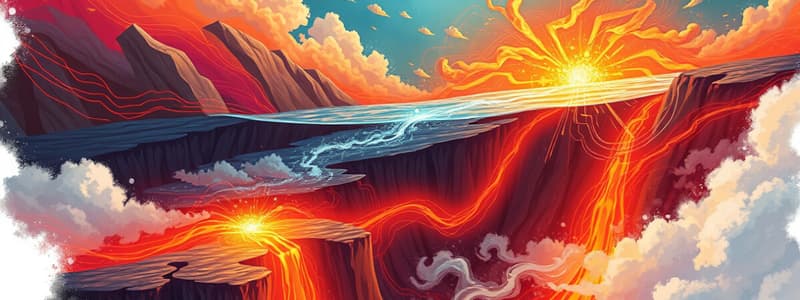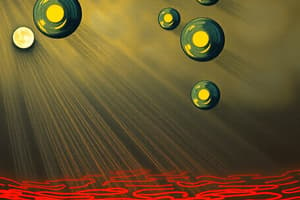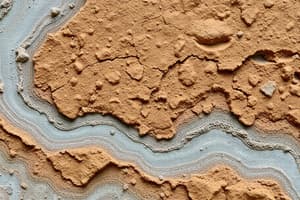Podcast
Questions and Answers
What do you think will happen to the convection currents in the mantle if the interior of Earth eventually cools down?
What do you think will happen to the convection currents in the mantle if the interior of Earth eventually cools down?
If Earth's interior cools down, the convection currents in the mantle will stop.
What causes the convection currents in the mantle?
What causes the convection currents in the mantle?
Cooler rock near the top of the mantle begins to sink as rock that was heated near the bottom of the mantle begins to rise.
Give an example of each of the types of heat transfer.
Give an example of each of the types of heat transfer.
Conduction: burning your hand on a hot stove, radiation: warming yourself near a fire, convection: heating up a mug of cocoa.
Describe the convection currents that occur inside Earth.
Describe the convection currents that occur inside Earth.
In which layers of Earth do convection currents occur?
In which layers of Earth do convection currents occur?
How is heat transferred through space?
How is heat transferred through space?
Compare the heating in the mantle to a cooking pot of soup.
Compare the heating in the mantle to a cooking pot of soup.
What happens to the density of a liquid that is heated?
What happens to the density of a liquid that is heated?
What are the three types of heat transfer?
What are the three types of heat transfer?
Convection currents in the Earth's crust cause volcanoes.
Convection currents in the Earth's crust cause volcanoes.
When you touch a hot pot or pan, energy moves from the pot to your hand. This is called:
When you touch a hot pot or pan, energy moves from the pot to your hand. This is called:
When you touch a hot plate, the transfer of heat from the plate to your hand is called ______.
When you touch a hot plate, the transfer of heat from the plate to your hand is called ______.
Scientists believe that differences in ____ cause hot, plastic-like rock in the asthenosphere to rise toward Earth's surface.
Scientists believe that differences in ____ cause hot, plastic-like rock in the asthenosphere to rise toward Earth's surface.
The energy from the sun that warms your face is transferred by a process called ______.
The energy from the sun that warms your face is transferred by a process called ______.
The heat from the Sun reaches Earth through convection.
The heat from the Sun reaches Earth through convection.
Convection currents affect the movement of plates on the Earth's crust.
Convection currents affect the movement of plates on the Earth's crust.
Scientists think that convection currents flow in Earth's:
Scientists think that convection currents flow in Earth's:
When the heat source is removed from a fluid, convection currents in the fluid will:
When the heat source is removed from a fluid, convection currents in the fluid will:
Convection currents produce the heat in the Earth's interior.
Convection currents produce the heat in the Earth's interior.
Study Notes
Convection Currents in the Mantle
- If Earth's interior cools down, convection currents in the mantle cease, impacting heat transfer.
- Convection currents are caused by cooler rock sinking while heated rock rises, establishing a continuous cycle.
Types of Heat Transfer
- Three types of heat transfer are conduction, convection, and radiation.
- Examples:
- Conduction: touching a hot stove
- Radiation: feeling warmth from a fire
- Convection: heating cocoa in a mug
Dynamics of Convection Currents
- Earth's core and mantle generate heat, driving convection in the asthenosphere, a slow-flowing upper mantle layer.
- Rising hot rock spreads and displaces cooler rock, which sinks back down, sustaining eternal convection cycles.
Locations of Convection Currents
- Convection currents are present in the mantle and outer core, contributing to geological activity.
Properties of Heated Liquids
- Heating a liquid results in decreased density, causing it to rise.
Convection and Geological Phenomena
- Convection currents in the mantle resemble the process in a pot of soup, where heated liquid rises and cooler liquid sinks.
- Convection currents do not directly cause volcanoes; rather, they affect the movement of tectonic plates.
Heat Transfer Mechanisms
- Radiation is how heat transfers through space, while conduction occurs when direct contact is made, such as touching a hot plate.
- The heat from the Sun reaches Earth through radiation, not convection.
Density and Convection Dynamics
- Density differences in the asthenosphere are crucial; they prompt hot rocks to ascend towards Earth's surface.
Effects on Earth's Structure
- Convection currents are instrumental in tectonic plate movement, influencing geological formations and activity.
- If the heat source is removed from a fluid, convection currents will eventually stop.
- Convection currents do not produce heat; they primarily transfer it within Earth's layers.
Studying That Suits You
Use AI to generate personalized quizzes and flashcards to suit your learning preferences.
Description
Explore the fascinating dynamics of convection currents within Earth's mantle and core. Learn about the types of heat transfer, how these currents affect geological activity, and the properties of heated liquids. This quiz will deepen your understanding of Earth's internal processes.




